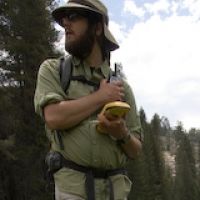Lucas et al., 2016
Polymictic pool behavior in a montane meadow, Sierra Nevada, CA.
Lucas, R.G., Suárez, F. Tyler, S.W., Moran, J.E., Conklin, M.H. (2016)
Hydologic Processes
-
Sierra, GRAD STUDENT
-
Sierra, INVESTIGATOR
Abstract
We observed polymictic behaviour in stream pools in Long Meadow, Sequoia National Park, California—part of the Southern Sierra Critical Zone Observatory. Stream pools stratified thermally during the day time and were isothermal at night—this pattern persists from the middle of summer into the fall. We found that four characteristics typical of a mountain meadow environment—low stream flow, open sky, cold groundwater discharge, and elevated organic carbon concentrations—are particularly conducive to pool stratification. Incoming shortwave radiation was the dominant energy input to heat pool water while nighttime emitted longwave radiation was the major cooling mechanism. Relatively cold groundwater discharge into the pool bottom increased density stratification within the pool. Elevated DOC concentrations increased the capacity of the pool to absorb photosynthetically active radiation and also promoted stratification. Stream velocities in the meadow were generally insufficient to meet threshold Richardson numbers and mix the pools during the daytime; smaller stream cross sectional areas would have potential for destabilizing pools in the daytime. We propose a conceptual model for describing polymictic stream pools and assessing the potential for polymictic pools to occur. Copyright © 2016 John Wiley & Sons, Ltd.
Citation
Lucas, R.G., Suárez, F. Tyler, S.W., Moran, J.E., Conklin, M.H. (2016): Polymictic pool behavior in a montane meadow, Sierra Nevada, CA. Hydologic Processes.
Explore Further


